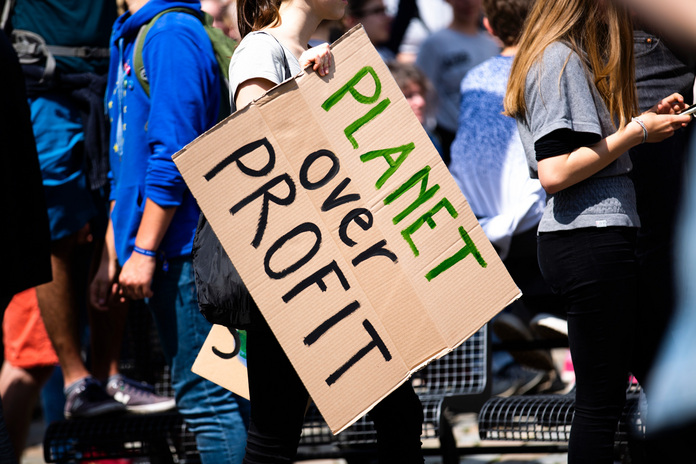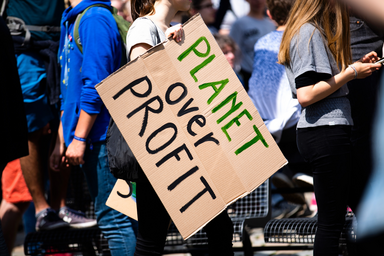In today’s world, it’s very easy to find companies that are letting down some community in a big way. Whether they use unsustainable business practices, they fail to speak out about social issues or they mistreat their employees, there is no shortage of companies that operate unethically in some department or another. So here’s a quick list of companies that are maybe, just a little bit, okay.
That being said, let me start with a HUGE disclaimer (and one that potentially does not need to be repeated, but which I will say again just in case)—there is no ethical consumption under capitalism! So, while this article highlights some companies that are “actually okay,” it might be more accurate to say that they are “actually maybe a little bit slightly okay considering the circumstances and economic systems that are operating within.”
Now that that’s out of the way… some companies that you can spend some money at (relatively) guilt-free!
1. Ben and Jerry’s®
Isn’t this one a relief! Yes, you can continue to buy pints of Coffee Coffee BuzzBuzzBuzz!® without shame. Ben and Jerry’s® has done a pretty darn good job utilizing fair business practices, from using sustainable ingredients to using profits to increase value of stakeholders and promoting growth and development for employees. The company also devotes a great deal of their platform to speaking out about social and political issues, educating their customer base on topics from climate justice to LGBTQ+ rights. Ben and Jerry’s® went as far as to upload an Instagram post on 4/20 addressing cannabis justice and racial disparities in cases involving marijuana. Best of all, Ben and Jerry’s® is B corp certified, a form of recognition for high levels of corporate social responsibility.
2. LEGO®
LEGO® has made some serious strides in regards to educating its customer base as well. The company has a strong commitment to advancing the ways in which play and creativity can advance early childhood development, and has made efforts to study and address how inequality can impact this development. LEGO® also maintains environmentally-focused initiatives, committing to sustainability through using recycled or renewable materials and producing little to no waste in production processes.
3. Warby Parker
Not only does this company produce some snazzy frames, it’s incredibly committed to equity and sustainability. Warby Parker has demonstrated continuously in impact reports its understanding and attentiveness to environmental issues, as well as its devotion to sustainability and diversity in its hiring and production processes. The company has explicitly addressed issues in racial equity and has specific plans in place to address the systemic inequalities that BIPOC face in corporate environments. Their devotion to equality and accessibility is further demonstrated in projects such as their Buy a Pair, Give a Pair initiative launched in April 2020 to provide healthcare workers and communities in need with necessary resources during the COVID-19 pandemic.
4. Dr. Bronner’s
Dr. Bronner’s is not only serving as a fantastic example of sustainable and ethical business practices, but is setting the stage for radical activism and advocacy within the business model. The company utilizes organic sources from local farms, operates on a near-zero waste production level and provides 100 percent free healthcare for employees. On top of this, Dr. Bronner’s advocates for some pretty progressive causes. Educating their customer base on topics like animal rights and psychedelic-assisted therapy, Dr. Bronner’s is going above and beyond in terms of speaking up about controversial and significant social issues.
5. Spotify
This one is a major relief, too—I’m not sure what I would do if I found out that the hours I’ve spent cultivating playlists were all for naught. Spotify is a 100 percent carbon neutral company and works within this model to uplift voices. The company devotes huge resources to focusing on how music can shape communities, socially and politically, and demonstrates their commitment to issues such as diversity in hiring and representation in their sustainability report.
6. Starbucks™
Starbucks™ has managed to produce their internationally-adored products within a sustainable and supportive business model. The company is committed to environmentally-focused goals, such as switching to 100 percent carbon neutral green coffee by 2030. Beyond this, Starbucks™ has demonstrated an accepting and radical approach to its hiring and training processes, ensuring that all employees receive anti-bias training and addressing the pay gap within its business model. The company also exemplifies support and devotion to its employees, offering full-time employees 100 percent tuition coverage for a bachelor’s degree through the Arizona State University online program.
7. Patagonia®
Through a base-model rooted in advocacy and awareness, Patagonia® has made itself one of the most prevalent companies in advancing environmental activism. Patagonia® Action Works was founded with the goal of supporting and promoting environmental activism, and does so in a number of ways—the company provides a plethora of opportunities for activism and supports grantees working on issues regarding land, water, climate, biodiversity and sustainable/Indigenous communities. Patagonia® also works to educate its customer base about the issues it addresses in its business structure, publishing works focusing on topics such as Indigenous owned and led land.
8. Glossier
Last, but most certainly not least, my personal favorite, Glossier. This company was founded on a democratization of beauty, breaking away from the “traditional beauty paradigm” that so many individuals feel suffocated by. Glossier also demonstrates environmental sustainability not only in its practices of using 100 percent recyclable shipping boxes and discontinuation of unsustainable products, but through its abstention from utilizing animal cruelty or testing of any sort.
Again, it’s important to acknowledge that none of these companies are, by any stretch, perfect. However, in today’s standards of unsustainable business practices, systemic racism and discrimination in capitalism, and silence in the face of rising social and political issues, these are just a few companies that seem to be trying a reasonable amount.


